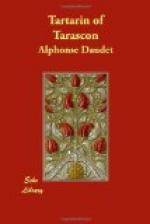The man who lodges most shot in his cap is hailed as king of the hunt, and stalks back triumphantly at dusk into Tarascon, with his riddled cap on the end of his gun-barrel, amid any quantity of dog-barks and horn-blasts.
It is needless to say that cap-selling is a fine business in the town. There are even some hatters who sell hunting-caps ready shot, torn, and perforated for the bad shots; but the only buyer known is the chemist Bezuquet. This is dishonourable!
As a marksman at caps, Tartarin of Tarascon never had his match.
Every Sunday morning out he would march in a new cap, and back he would strut every Sunday evening with a mere thing of shreds. The loft of Baobab Villa was full of these glorious trophies. Hence all Tarascon acknowledged him as master; and as Tartarin thoroughly understood hunting, and had read all the handbooks of all possible kinds of venery, from cap-popping to Burmese tiger-shooting, the sportsmen constituted him their great cynegetical judge, and took him for referee and arbitrator in all their differences.
Between three and four daily, at Costecalde the gunsmith’s, a stout stern pipe-smoker might be seen in a green leather-covered arm-chair in the centre of the shop crammed with cap-poppers, they all on foot and wrangling. This was Tartarin of Tarascon delivering judgement — Nimrod plus Solomon.
III.
“Naw, naw, naw!” The general glance
protracted upon the good town.
After the craze for sporting, the lusty Tarascon race cherishes one love: ballad-singing. There’s no believing what a quantity of ballads is used up in that little region. All the sentimental stuff turning into sere and yellow leaves in the oldest portfolios, are to be found in full pristine lustre in Tarascon. Ay, the entire collection. Every family has its own pet, as is known to the town.
For instance, it is an established fact that this is the chemist Bezuquet’s family’s:
“Thou art the fair star that I adore!”
The gunmaker Costecalde’s family’s:
“Would’st thou come to the land
Where the log-cabins rise?”
The official registrar’s family’s:
“If I wore a coat of invisible green,
Do you think for a moment I could be seen?”
And so on for the whole of Tarascon. Two or three times a week there were parties where they were sung. The singularity was their being always the same, and that the honest Tarasconers had never had an inclination to change them during the long, long time they had been harping on them. They were handed down from father to son in the families, without anybody improving on them or bowdlerising them: they were sacred. Never did it occur to Costecalde’s mind to sing the Bezuquets’, or the Bezuquets to try Costecalde’s. And yet you may believe that they ought to know by heart what they had been singing for two-score years! But, nay! everybody stuck to his own ,and they were all contented.




